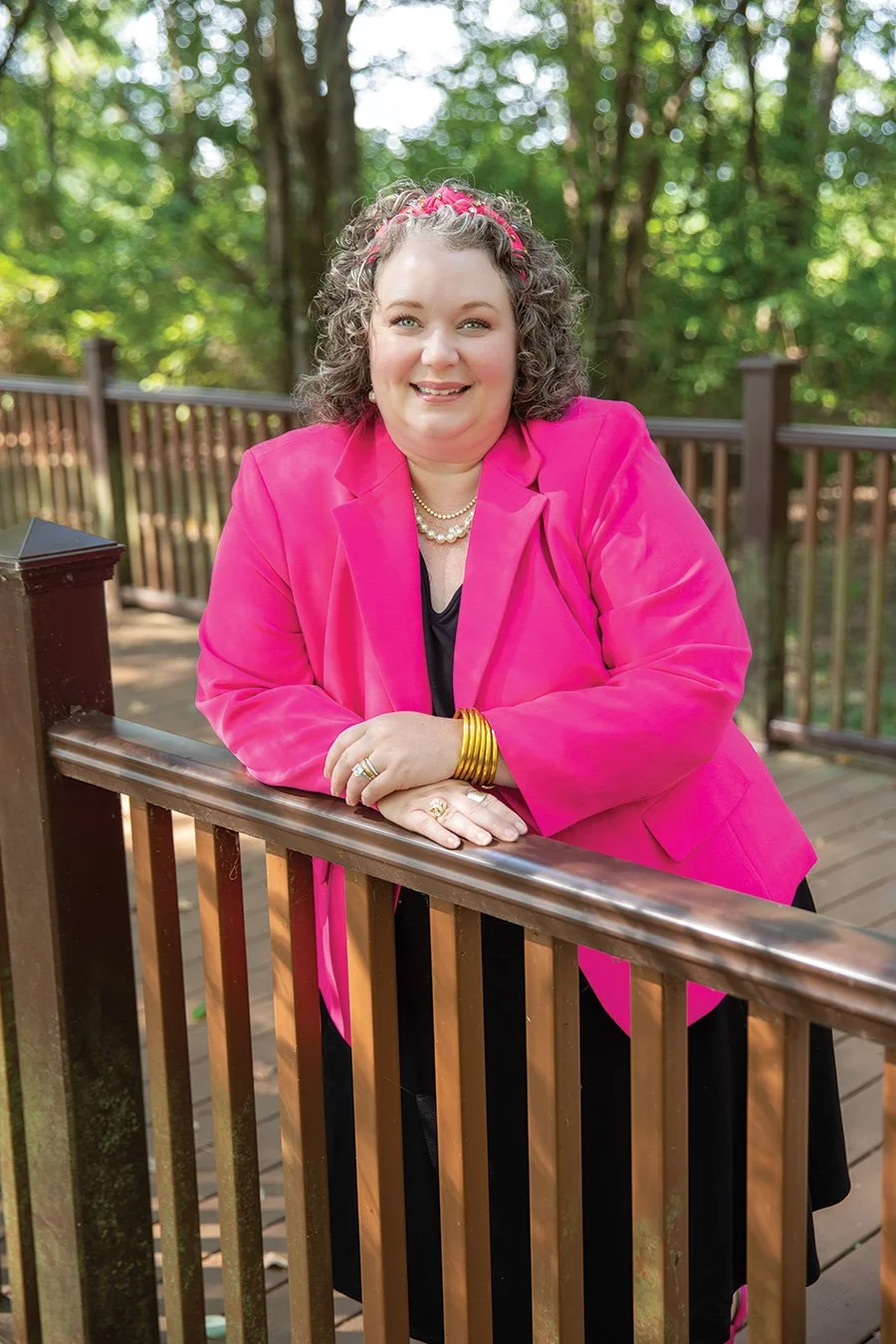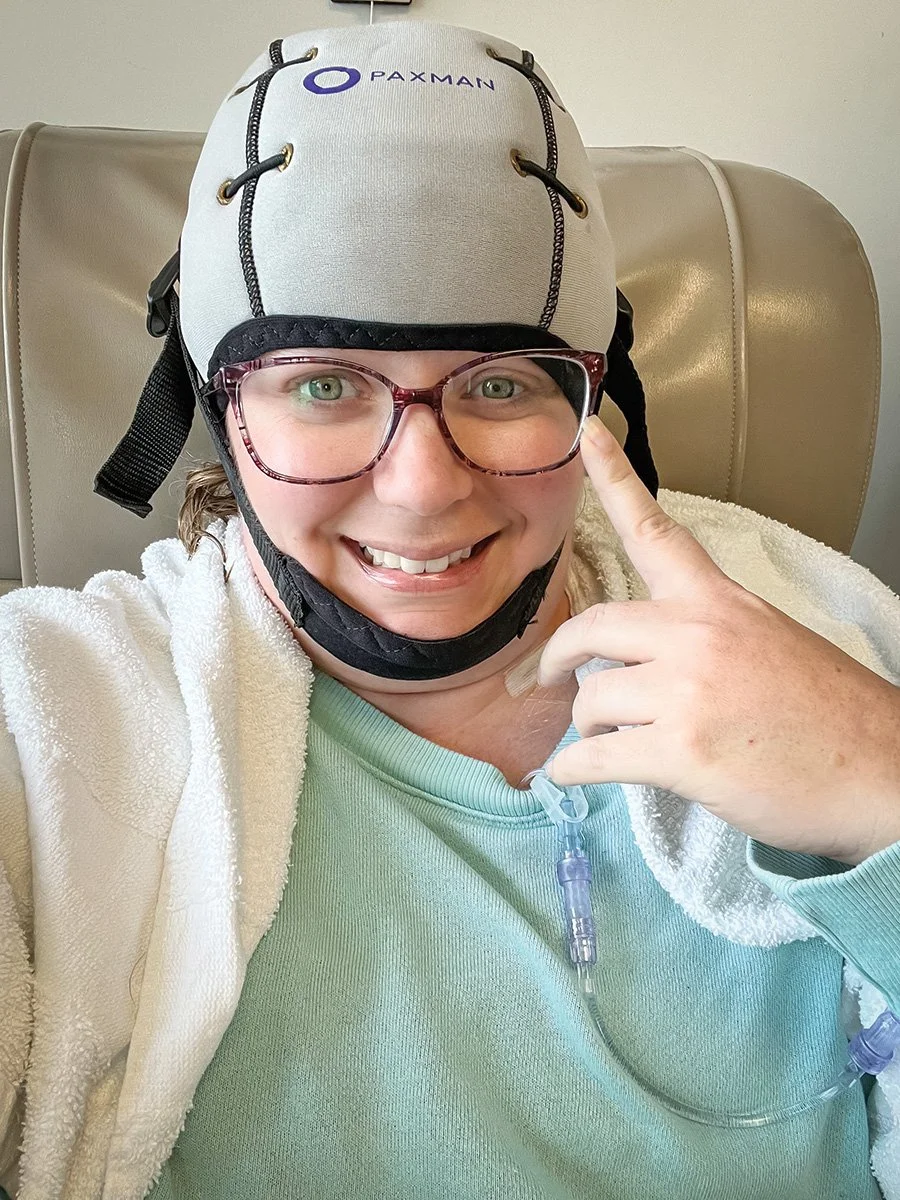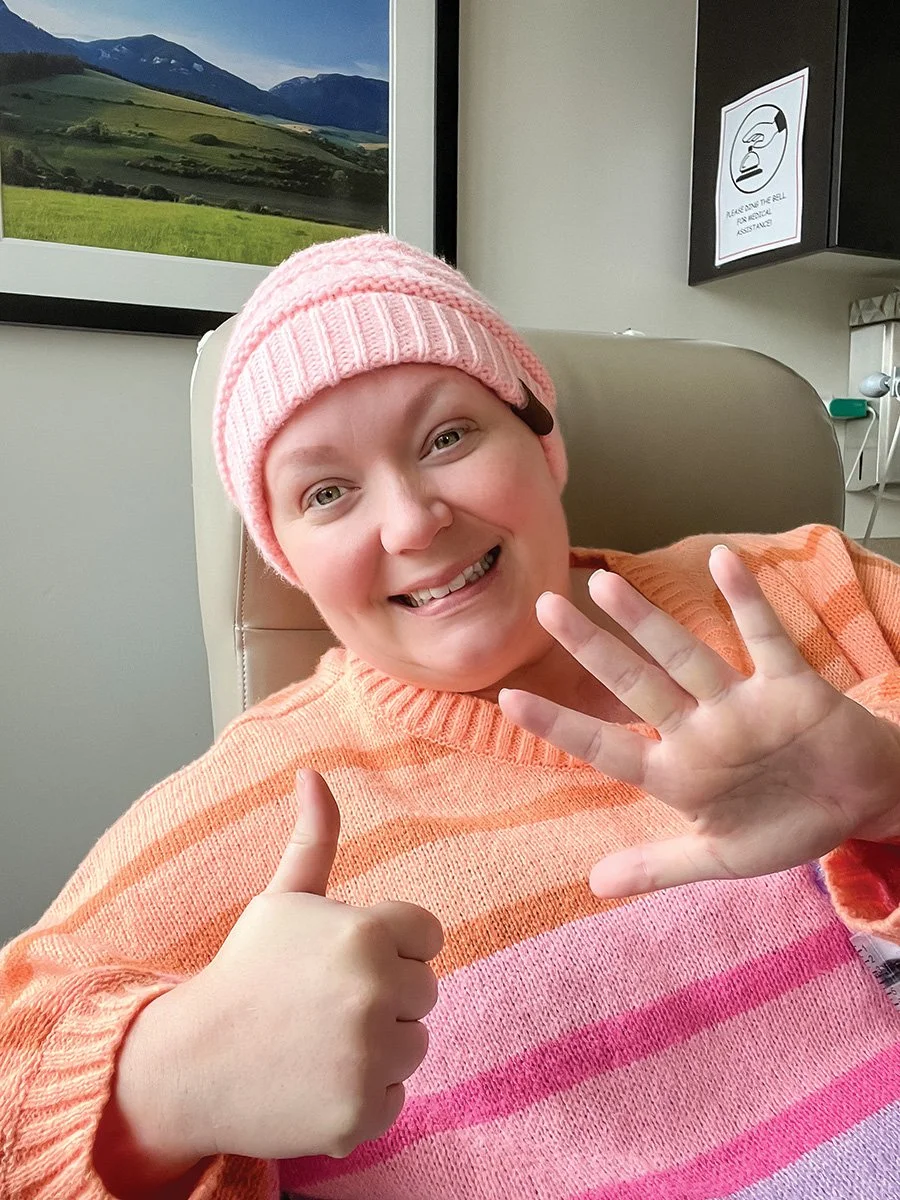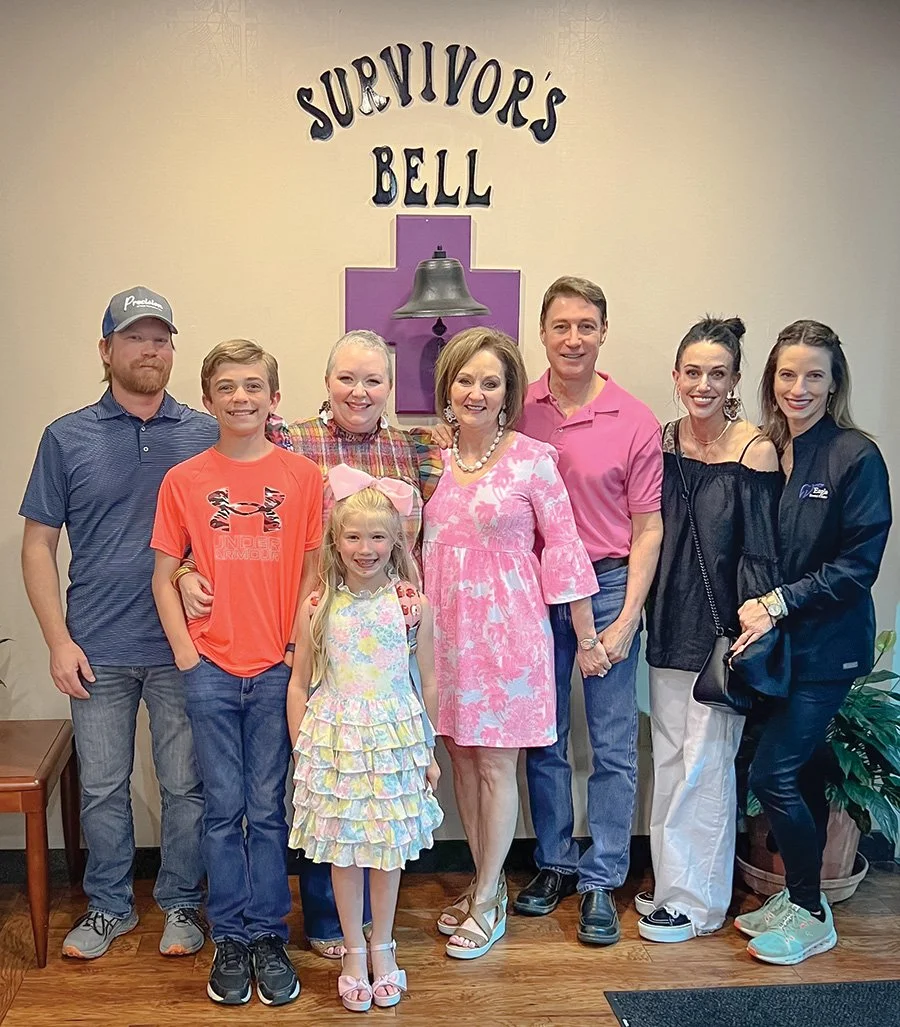Light in the Valley
/With optimism and perspective, Brittanie Cooper-Stone navigated treatment for aggressive breast cancer
By Ellen Orr
photo by shane darby.
In April 2023, then–42-year-old Brittanie Cooper-Stone made a mammography appointment, just to get her husband off of her back.
“I was like, ‘Keith, really? They said I was fine [at my last mammogram], so I’m not really worried about it,’” she recalled. “But he just kept pushing and kept pushing, so finally I called and scheduled.”
Brittanie felt healthy and could find no lumps through self-examinations. And though her mother had survived breast cancer, Brittanie was not concerned; she had been tested for the BRCA mutation after her mother’s diagnosis in 2019, and she was not a carrier. There was no additional breast cancer in her family history.
photo by alexandria ware photography.
“If my husband hadn’t been steadily pestering me, I wouldn’t hvave gotten a mammogram,” she said. “I truly did it just to get him to leave me alone about it.”
Brittanie’s mammogram results came back irregular; she was called in for a follow-up mammogram and ultrasound. The screening revealed multiple spots in Brittanie’s right breast; the medical team performed a biopsy then and there.
“All these different things have not worked out the way we wanted them to, but I feel like so many positive people have been placed in my life to be supportive, between family, friends, coworkers, and [medical professionals].”
When the biopsy results indicated cancer, Brittanie was referred to the Charles A. Sammon Cancer Center at Baylor Scott and White. Her first appointment was in June of 2023. As she and Keith drove to Dallas, she mentally prepared for a double mastectomy.
“I had a friend who’d had breast cancer, and my mother had had breast cancer,” she said. “They had everything taken out [surgically] and had their reconstructions done, all at the same time—no chemo, no radiation. So I was just like, ‘Okay, no big deal. We’ve had friends go through this. Mom’s gone through this. We’re good.’”
After preliminary testing, Brittanie’s doctor informed her that a double mastectomy would be wise—but that chemotherapy would also be necessary. Her cancer was grade-3 (fast-growing and most likely to spread) and both estrogen- and HER2-positive. They also learned that, while Brittanie’s BRCA genes were typical, her CHEK2 gene was mutated.
Brittanie attempted to save her hair with the use of a cold cap. She quickly determined, however, that the discomfort was too great. submitted photo.
In August, Brittanie underwent a double mastectomy. Surgeons uncovered five cancerous spots, which were larger than had been predicted. They also found that it had spread to one of her lymph nodes; this meant, after chemo and reconstruction, Brittanie would need radiation. Her surgeon placed tissue expanders under her chest muscles, in preparation for eventual reconstruction. The plan was for Brittanie to recover from surgery before receiving chemotherapy. After chemo, she would undergo reconstructive surgery. Radiation would come last, as it damages tissue and complicates reconstruction.
However, Brittanie’s post-mastectomy scars did not heal properly. “The skin kind of started dying off,” she said. She had to undergo another surgery, and the expanders were flattened. They would need to be refilled very gradually to prepare for the placement of implants—all of which would need to happen concurrently with her chemotherapy treatments, given the aggressive nature of the cancer. “My plastic surgeon and oncologist started working really closely together because they knew that we were on a tight timeframe,” Brittanie said.
Through all of this, very few people were aware of Brittanie’s cancer. “I don’t overly share [in general], and I didn’t want a lot of people asking [about my cancer], because sometimes I feel like people ask about stuff not necessarily because they care,” she said. “And I wanted to keep everything very normal for my kids. I didn’t want them steadily get getting asked, or getting those looks, or somebody saying to them, ‘So-and-so had breast cancer, and they died.’”
For the first six months after diagnosis, only family members and close friends were informed. However, when Brittanie shaved her head in December of 2023, the circle inevitably widened.
With optimism and perspective, Brittanie Cooper-Stone navigated treatment for aggressive breast cancer. submitted photo.
“The chunks of hair coming out in the shower . . . that was more traumatic than just not having hair,” she said, “so we shaved it.” She had the hairdresser shave a “K” into the back of her head, “for Keith,” and took a photo for her children before going totally bald. When her hair began growing back post-chemo, Brittanie and her preteen son, Cooper, would joke about their respective hair styles. “He kept measuring himself and asking, ‘Am I taller than you yet?’” she recalled. “And I would say, ‘Well, I don’t know. Is my hair longer than yours yet?’ We tried to keep everything light and fluffy.”
After her regular chemotherapy treatments were complete, Brittanie received 18 rounds of targeted chemo immunotherapy, administered every three weeks. Following that, she underwent radiation treatments, five days a week for six and a half weeks. When those treatments concluded in June of 2024, she began taking an anti-HER2 oral medication. One potential, though rare, side effect was cellulitis, which 0.4% of patients experience on the drug. Brittanie developed cellulitis in her right breast, which necessitated two week-long hospital stays for IV antibiotic treatments, as well as the removal of one of her implants. The plan moving forward is to pull healthy muscle from her back to reconstruct the breast, as expanding and implanting is no longer possible post-radiation. The surgery should happen later this year.
In the midst of treatment, Brittanie joked with her children that she had a “dad bod,” with her bald head, flat chest, and chemo-induced weight gain in her belly. This levity and lack of superficiality came from knowing that “everything could always be worse,” she said. “There’s no reason to sit there and say, ‘Oh, poor, pitiful me.’ Other people have it a lot worse, so let’s just take it one step at a time and look at where we can find the silver lining.”
Still, she is looking forward to what will likely be her final reconstructive operation. “Clothes don’t fit right,” she said. “And people say, ‘Oh, get a prosthetic,’ but I love being in the pool and at the lake, and swimsuits, no matter what type you get, just don’t fit right [with a prosthetic]. So I’m going to give it one more try and see how it goes.”
Celebrating her last day of radiation, Brittanie rang the “survivor bell,” surrounded by her family. submitted photo.
Though she has since stopped taking the cellulitis-causing medication, Brittanie will continue taking a different hormone therapy drug for the next seven to 10 years. She is screened via X-ray every six months for recurrence. Her hair is again longer than her son’s, and curlier than ever before. She is enjoying Cooper’s musical performances in the Pleasant Grove Middle School Band, and she is excited to watch her daughter, fourth grader Carter Marie, dance this winter in The Nutcracker. Though her cancer journey is not yet complete, Brittanie is feeling lighter and well loved.
“All these different things have not worked out the way we wanted them to, but I feel like so many positive people have been placed in my life to be supportive, between family, friends, coworkers, and [medical professionals],” she said. “Kim Keith, one of my friends who used to drop stuff off all the time, left me this note that said, ‘God doesn’t promise that we’ll never go through valleys, but He does promise that we’ll never be alone.’”





